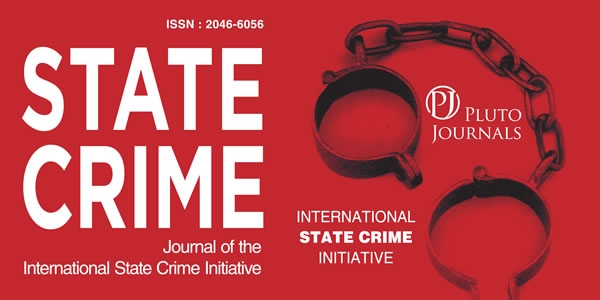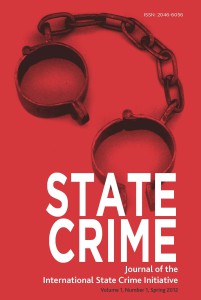State Crime Journal
submit to s.knowles-mofford@qmul.ac.uk (Sophie Knowles-Mofford, Assistant Editor)
‘State crime is an indispensable journal for anyone concerned with all forms of official wrongdoing, which should be for all of us’ – Richard Falk (Albert G. Milbank Professor of International Law and Practice Emeritus, Princeton University and Distinguished Honorary Fellow at ISCI)
State Crime is the first peer-reviewed, international journal that seeks to disseminate leading research on the illicit practices of states. The concept of state crime is not confined to legally recognised states but can include any authority that exerts political and military control over a substantial territory (e.g. the FARC). The journals focus is a reflection of the growing awareness within criminology that state criminality is endemic and acts as a significant barrier to security and development. Contributions from a variety of disciplinary and theoretical perspectives are welcomed. Topics covered by the journal include, torture; genocide and other forms of government and politically organised mass killing; war crimes; state-corporate crime; state-organised crime; natural disasters exacerbated by government (in)action; asylum and refugee policy and practice; state terror; political and economic corruption; and resistance to state violence and corruption.
Editors-in-Chief: Penny Green, Tony Ward, Kris Lasslett, Thomas MacManus
Assistant Editor: Sophie Knowles-Mofford
ISSN Print: 2046-6056 / ISSN Online: 2046-6064
 Subscribe to State Crime from Pluto Journals.
Subscribe to State Crime from Pluto Journals.
For individual subscriptions, for both digital and hard copies, please go to: http://www.marston.co.uk/pluto-journals/scj.html. Please contact Roger Van Zwanenberg (Rogervz@plutojournals.com) if any problems are encountered.
View State Crime Journal on JStor
State Crime’s Code of Conduct:
The Editors-in-Chief of State Crime (‘the Editors’) are accountable for everything published in their journal and, as such, strive to meet the needs of readers and authors and to constantly improve their journal. The Editors strive to ensure that peer review at their journal is fair, unbiased and timely. The Editors’ decisions to accept or reject a paper for publication is based on the paper’s importance, originality and clarity, and the study’s validity and its relevance to the remit of the journal. The Editors encourage ethical research. The Editors seek to foster debate and consider cogent criticisms of work published in their journal. They champion freedom of expression and seek to maintain the integrity of the academic record. The Editors are willing to publish corrections, clarifications, retractions and apologies when needed. The Editors have a duty to act if they suspect misconduct and will first seek a response from those accused. If they are not satisfied with the response, they will ask the relevant employers or some appropriate body to investigate. The Editors should make all reasonable efforts to ensure that a proper investigation is conducted and make all reasonable attempts to persist in obtaining a resolution to the problem.
- Order By:
-
Wars of Choice or Crime? The National Interest, State Crime and Official Overseas British Military Interventions Since 1945 (Vol. 3, No. 1, Spring 2014, pp. 29-49)
Since 1945 British governments, as a matter of official policy, have undertaken a number of military interventions...
-

Border Controls in Europe: Policies and Practices Outside the Law (Vol. 3, No. 1, Spring 2014, pp. 4-28)
The forced migrant to Europe is hostage to a tight “migration-security nexus”, their conversion into a globally...
-
Punishment of Serious Human Rights Violations by Changing Internal Moral Codes (Vol. 2, No. 2, Autumn 2013, pp. 173-195)
The modern era has awoken a period of extreme terror used both by states and against them to attack peoples or their...
-

Prison as a Liberated Zone: The Murals of Long Kesh, Northern Ireland (Vol. 2, No. 2, Spring 2012, pp. 149-172)
In Northern Ireland’s Long Kesh prison in the late 1980s and 1990s, prisoners from each of the loyalist and...
-
Image Politics and the Art of Resistance in Syria (Vol. 2, No. 2, Spring 2012, pp. 135 – 148)
In what has quickly become one of the bloodiest and most protracted of the uprisings across the Arab world,...
-
Mubarak’s Egypt — Nexus of Criminality (Vol. 2, No. 2, Spring 2012, pp. 122-134)
Employing a Marxist framework, this article examines how neo-liberal agendas for development pursued by successive...
-
Of Mice and Men: Violence and Human Experimentation (Vol. 2, No. 1, Spring 2012, pp. 79-90)
Unethical human experimentation has long been a murky feature of medical research, most notoriously in the death camps...
-
Corporate Donations to Electoral Campaigns: A Case Study of White-Collar Crime (Vol. 2, No. 2, Spring 2012, pp. 52-71)
Mackenzie and Green (2008) and McBarnet (2006) have argued that it is possible for white-collar crimes to emerge from...
-
Crowdsourcing Research: A Methodology for Investigating State Crime (Vol. 2, No. 2, Spring 2012, pp. 30-51)
“Crowdsourcing” now gets 10 million hits on Google, and is being applied to research in commercial, media,...
-
Inquiring into Collusion? Collusion, the State and the Management of Truth Recovery in Northern Ireland (Vol. 2, No. 2, Spring 2012, pp. 4-29)
This article critically examines the issue of collusion as part of truth recovery and post-conflict transition in...










































